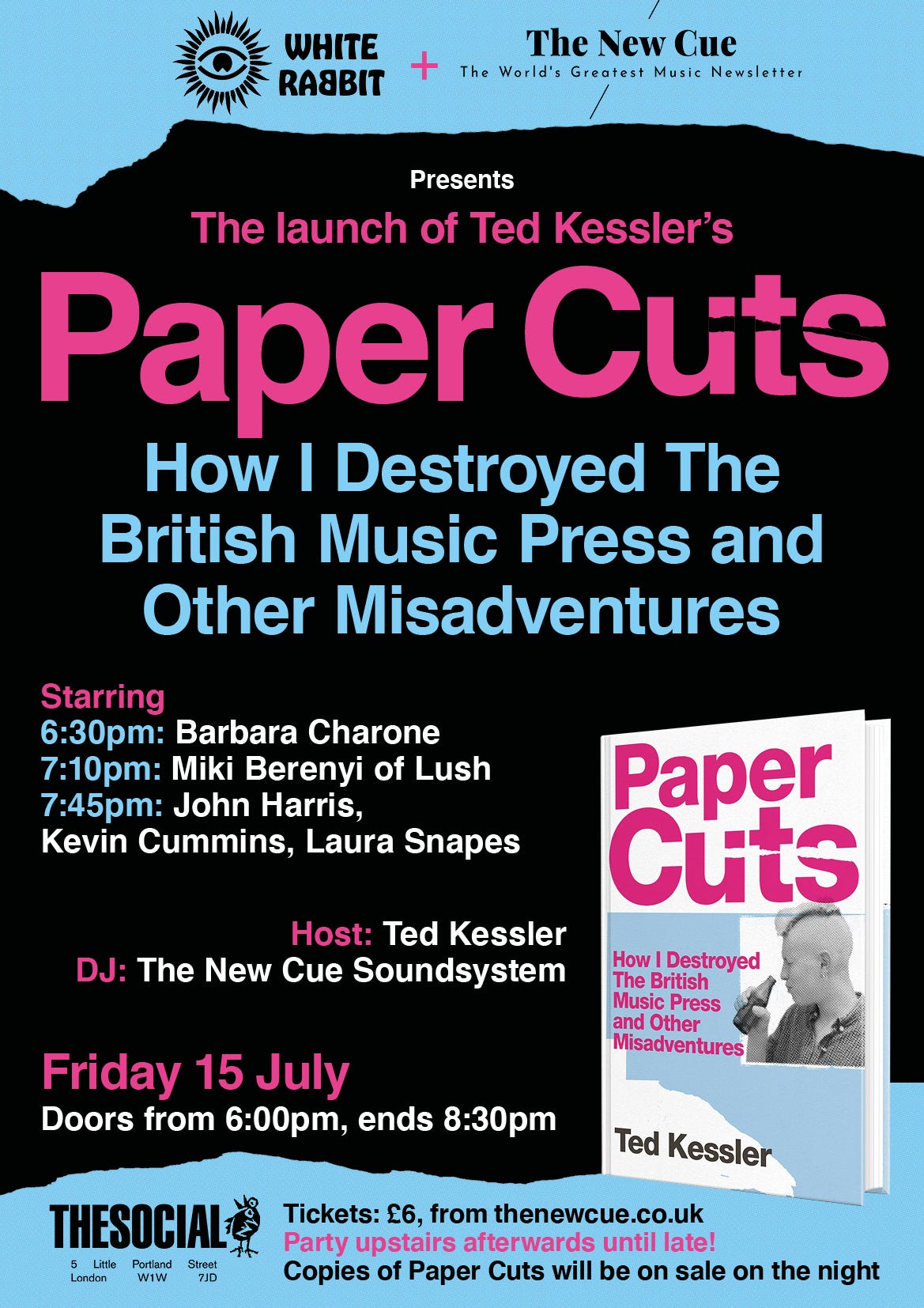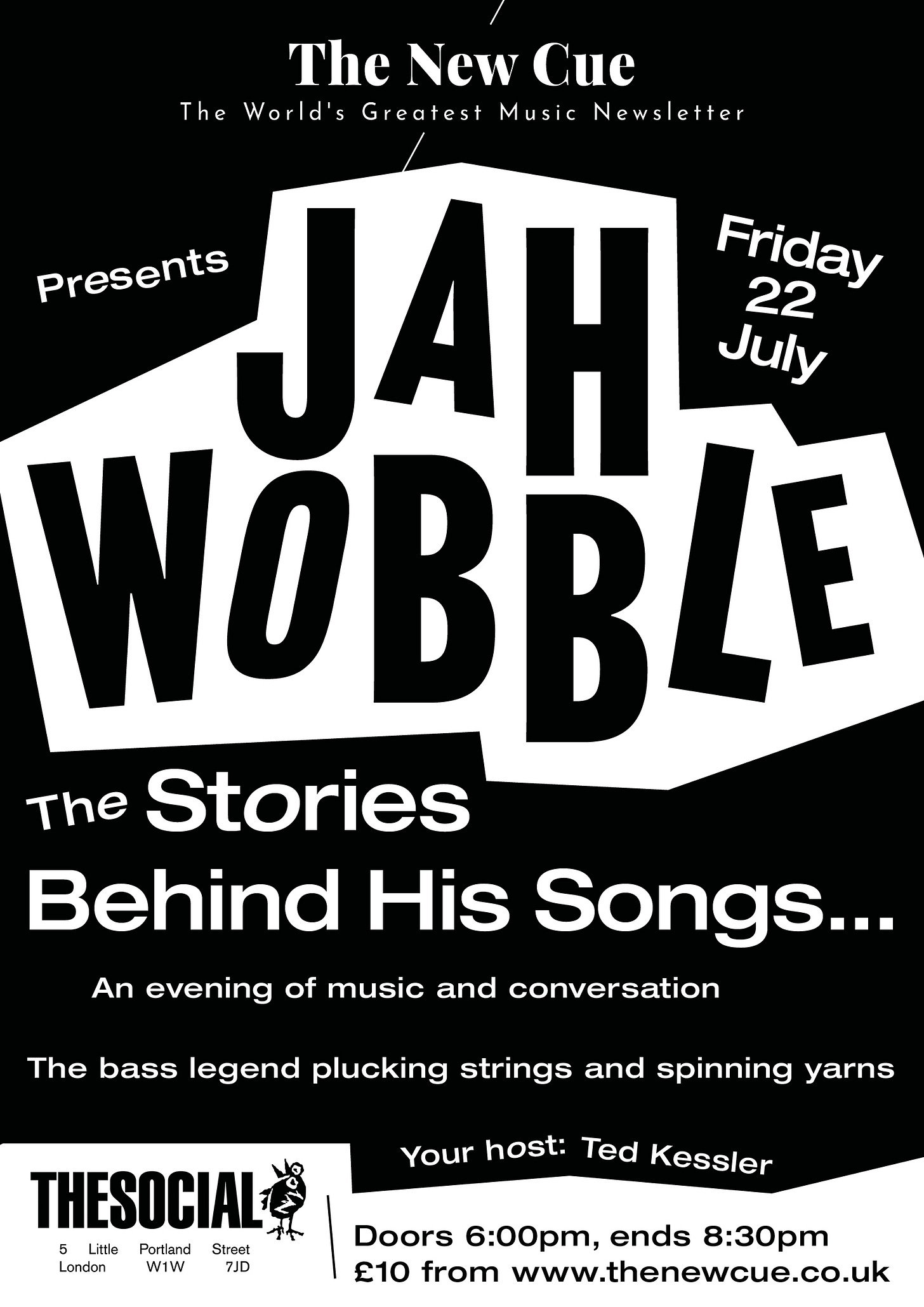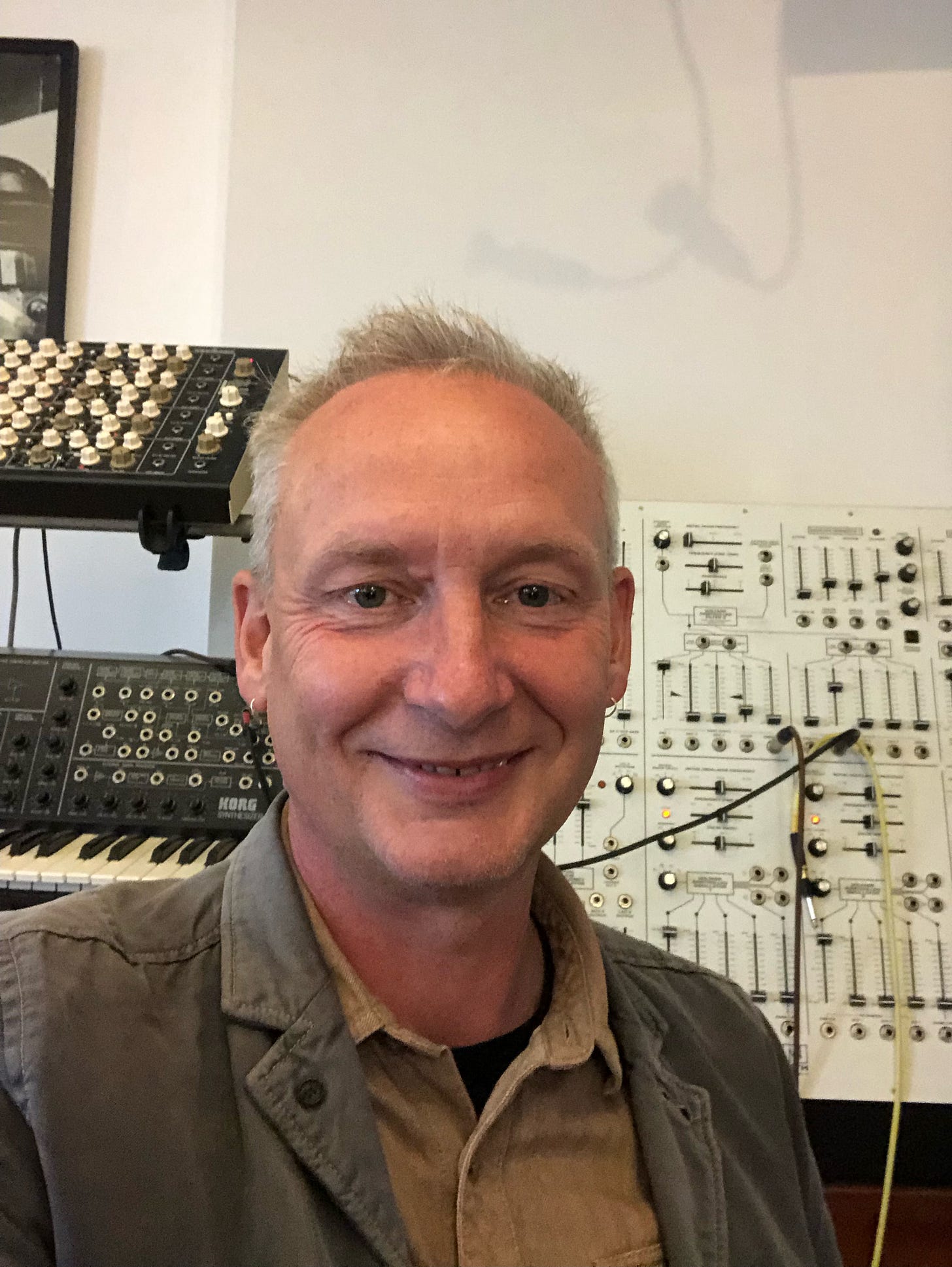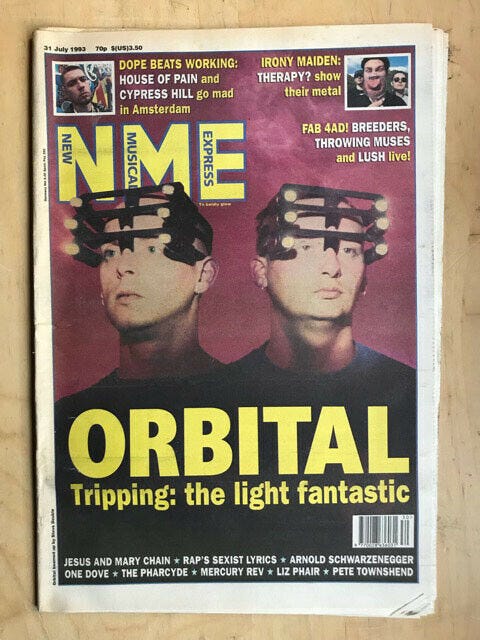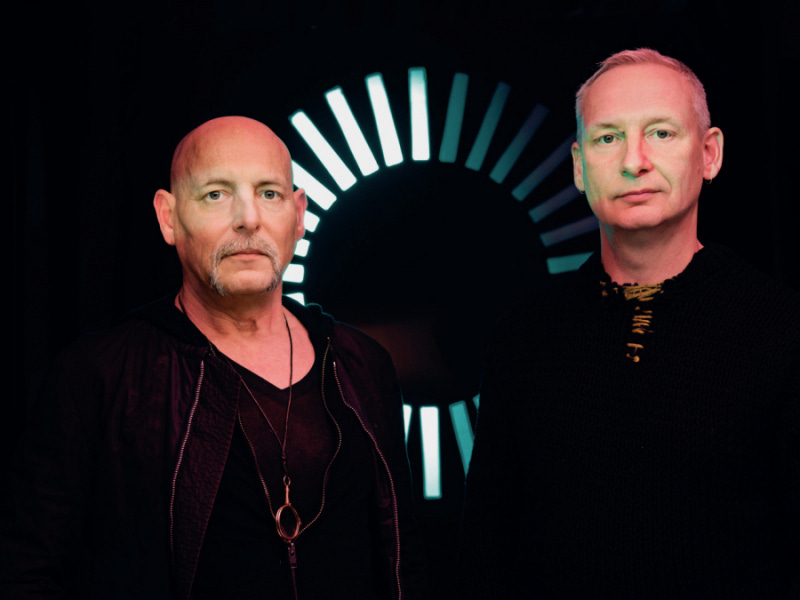Morning,
Welcome to your week. Sun is shining, the weather is sweet, yeah, makes you wanna move your dancing feet now. To the rescue, here we are!
Let’s start the week with a nice chat with Paul Hartnoll, 50% of UK’s foremost techno trailblazing superstars Orbital, alongside his older brother Phil. That’s below the line. Tuck in, it’s free. Please don’t forget we have two events for sale currently, for Ted’s Paper Cuts book launch on July 15th.
And also an evening of conversation and music with bass master Jah Wobble on July 22nd.
There are still - UNBELIEVABLY - a few tickets for each available, so if you’d like to join us, do so by hitting this link here.
Anyway, have a lovely Monday. We’ll see you on Wednesday. Feel free to tell your pals about us.
Enjoy the edition,
Ted, Niall and Chris.
Start The Week With… Paul Hartnoll of Orbital
Kentish brothers Paul and Phil Hartnoll first appeared in our musical consciousness with Chime, recorded in 1989 on a four-track recorder in a cupboard under their dad’s stairs. It became an anthem that late summer at the Orbital M25 raves that the duo took their name from and was eventually re-released by FFRR Records (the dance wing of major label, London), continuing to grow in popularity until it reached number 28 in the charts. The duo were then invited on to Top of the Pops, having to bunk off shifts in Pizza Express to do so. Eventually, the single ended up at number 17, which was an incredible achievement for a wordless demo tape.
From there, Orbital became a pioneering dance act. They made that first career leap from the DJ to the creator possible, from the track to the album, leading the way for the huge boom in UK dance music of the early and mid ‘90s alongside (but slightly ahead of) The Chemical Brothers, Prodigy, Leftfield and so forth. They’ve fallen out a few times, as brothers do, and they’ve split up a few times. But they’re still very active and are celebrating their pandemic-delayed 30th anniversary with the release 30 Something on July 15th. It contains reworks, remakes, remixes and re-imaginings of landmark Orbital tracks based on the duo’s famous live show. The album also involves Orbital-inspired artists and DJs.
I started making my own Spotify playlist for you to listen to as you read, but they’ve done a very similar, perhaps more complete version themselves so just use that instead.
Hello Paul, nice to see you.
And you, Ted! Not seen you for years.
Long-time no-see, in actual fact.
I was trying to work out when the last time was. I honestly don’t know.
I reckon the late ‘90s.
That’s what I thought. Somewhere in that blurry background of the late 1990s.
I saw you in a nightclub or at a gig, possibly at an awards ceremony later than this, too, but the last time I interviewed you was for In-Sides, I think, in 1996…
Blimey. Was it? You’ve interviewed me a few times before then too.
We go back, interview-wise. What’s new?
Ha! Not much. On and off with the band, obviously. A few attempts at solo careers, things like that, before realising that that never works. Well, it can do but I can’t get away with it. I never had the balls to stick at a solo career for long enough, that was my problem. I see you have a book coming soon! I see that knocking about, being advertised.
There is an Orbital section in it, actually. It’s the backstory to the NME feature I did in 1993 about Orbital that was commissioned as a page but suddenly at the last minute became a cover story.
Was that around the second album?
Yeah, on the cover you were wearing torch glasses.
Steve Double made us wear three pairs for the photos. Our first NME cover. Possibly the only one? Might have been another one.
There was another one. I wrote that too.
I remember that first one. You came to a gig, maybe Megadog, and then you came to the Strongroom a week later going ‘ooh, I’ve got to make this a cover now and I haven’t done much before!’ And we were, like, we haven’t done much either.
We were all a bit giddy. Actually, the second one was for The Box.
Ah, right. Yeah.
As we’re talking about the old days… it’s your 31st anniversary currently but you’re celebrating your 30th anniversary with this album instead. What shape does it take?
It was originally going to be Orbital 30 but the pandemic and various changes at record labels and things like that delayed it, so it’s now 30 Something. If we’d been really smart it could’ve been 33 & 1/3, but I couldn’t be arsed checking the timeline. I always liked the idea of comparing how we played songs in 1990 to how we play them now. We’ve played these songs for so many years that they’ve morphed and changed many times over. Instead of comparing them with live recordings I hustled through all the tracks that we play in strict rotation, that we can’t not play, and put them down in their live form without overthinking it. So here they are in their current form. It’s like Cilla Black singing Anyone Who Had a Heart, I guess.
Except she’s dead, of course, which is a handicap.
Well, yeah. Makes it more difficult. Anyway, because of the improvisational nature of the way we play live you don’t really notice the tracks changing, but they do morph over time. The other half of the album is various remixes from young folk and the odd slightly older folk, like David Holmes. We got him to do Belfast because we called the track Belfast after him, after seeing him play there in 1990. It had to come full circle.
What’s the current status of Orbital? How are the two Hartnolls?
We’re still on.
But you’ve split up a couple of times.
This is our third time round the block. The third Orbital. We’re doing a few festivals this summer to celebrate this album. It’s all a bit sketchy getting gigs sorted this summer because of the pandemic, but we have some good ones. I’m also doing the last pass on some vocals on a track for the new album.
Ooh…
The idea was to the get this Orbital 30 out June, July and have a new album in October. But because of firstly the vinyl shortages and now, apparently, card shortages for record covers because – and this is a good thing – the demand is so high for vinyl that when you make a new album you have to do vinyl at the same time. Before it was like, yeah, we can knock out a few vinyl at some point. Now it’s got to the point that vinyl is actually making some money. There’s so few vinyl factories that everything has to wait. So it can’t come out until next February because we’re in a holding pattern above the vinyl equivalent of Heathrow. But there’ll be a single in October first.
How’s your relationship nowadays with your brother?
It’s alright, actually. It’s really good. Many hundreds of pounds on therapy later and everything’s great.
Where do you both live now?
I live in Brighton and so does Phil. I can see his house from my back garden. You’d need a telescope to properly spy on him, though. You see each other on a daily basis for months on end when you’re working on something but when we’re gigging we tend not to see each other outside of a gig. We do see each other socially sometimes too, all the usual things with siblings.
Before we spoke, I was thinking about that moment from around 1991 to ’94 when Orbital, alongside a few other like minds, changed how dance music grew; from being about DJs to being about creators, from tracks to albums, from clubs to gigs… Well, you imitate your heroes. So all I was doing was copying the format that I’d seen with Kraftwerk, Severed Heads, Cabaret Voltaire, Front 424, all those pre-house music bands. I listened to their albums and they were good albums. To me, it seemed obvious to make albums. There hadn’t been many dance albums. Those New York electro acts made piss-poor albums. Much as I loved them, it was all about 12-inchs. Same with house music. It didn’t translate to albums. But I never think of us as a house music act, there were just some house stylings in there because that was what was happening at that time when I was 18, 19 and enjoying electronic music. I never really liked that soulful piano house. It was Detroit techno and acid house that blew up for me. So the albums became a mix of that with the Kraftwerk kind of stuff I also listened to.
What would you say to the 19 year-old Paul Hartnoll, what advice would you offer?
Oof… keep going, son. Maybe have some more time off. I never stopped. I’d work twelve hour days but that was because I loved it. Give me a week off and I spend it in the studio. It’s vocational. Ridiculous, really. I’m not like that now.
No?
Since I had kids in 2001 I stop at 5:00 every day. I mean, I’ll finish the chord. But I generally finish at that time. My daily routine is that I meet my mate Pendle down at the beach, we sit on deckchairs like old codgers, drinking coffee and then both toddle off to our respective studios around 10:00. It’s really nice. Brighton sea front changed dramatically in the lockdown. There was always the dog walkers but it became properly full of local people. Life carried on there and it’s become a thing now. There’s a real community feeling down on the sea front. It’s great.
I saw you did the music for the new Mike Myers Netflix comedy, The Pentaverate.
So much fun. It’s bombed terribly, the actual show. The reviews are fucking awful. Oh yeah. I keep meeting people who like it as a dirty secret – it’s very crude – but I had so much fun doing it. It’s something I want to do more of. I did series two of Peaky Blinders, which was great fun, too.
How does it differ from Orbital?
Well, I suppose it’s similar to… if you’re fit because you’re a regular runner but then you go to the gym it’s a different work-out. You’re challenged in a different way. Every director challenges you in a different way because you are properly collaborating with a director. I really like that. You’re honing your creativity in a direction you didn’t expect before. I especially like it at this age, nine or ten albums in. Like, how do I change it, mix it up? Every TV or film thing throws you a new curve ball.
What have you got planned for the rest of the day?
I’m going to wrestle these vocals in to shape.
Are you doing them yourself?
No, no. I’m not singing. Jesus. It’s a collaboration with Anna B Savage. I’m going to position them and then sit back in a nice warm glow. Again, another collaboration. Done quite a lot of collaboration on this album, which again throws you a curveball of working with singers. I like working with singers, though I’ve had mixed results so it’s a case of learning how that collaboration works.
Well, thanks for your time Paul.
No problem. I’ll have to get you to sign your book. I like to get things signed, something for my kids to sell when I’m dead.
Bit more valuable on Ebay.
You never know!
Cheers Paul, see you soon hopefully.
And you Ted.
TK




